Narayana Nethralaya stands as one of the country’s premier eye hospitals, renowned for delivering world-class superspeciality care for a wide range of corneal conditions. With a team of highly skilled corneal surgeons, cutting-edge diagnostic technology, and state-of-the-art operation theatres, we provide an ideal environment for comprehensive eye treatment. What truly sets us apart, however, is the core value that guides every member of our team — an unwavering commitment to patient-centric care. At Narayana Nethralaya, our patients are at the heart of everything we do.

Eye infections need to be addressed immediately in a systematic and meticulous way to prevent long-standing sequelae in the form of ocular surface disturbances and visual complications. We have expertise in providing accurate diagnosis with effective management of corneal ulcers, infectious conjunctivitis, and other eye infections. Our hospital is equipped with a state-of-the-art, NABH-accredited microbiology lab, which helps in aiding the diagnosis.
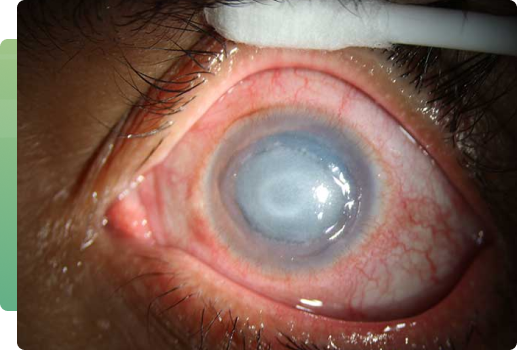
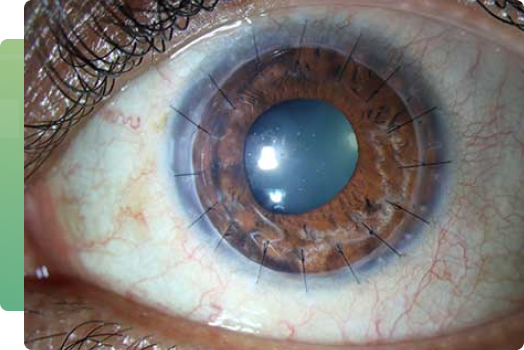
We offer all the different kinds of corneal transplantation services for a variety of conditions. As we are a tertiary care centre and a referral centre for patients from around the country, our doctors are trained to handle even the most advanced of cases needing specialized management.
Dry eye, an emerging silent pandemic, is a condition associated with limited production or rapid evaporation of tears, which requires timely management to avoid irreversible surface changes and visual disturbances. Narayana Nethralaya has been running a specialized dry eye clinic for many years, which is equipped with the latest diagnostic and treatment options. This helps us assess the impact of dry eye on every aspect of the patient’s daily life and customize treatment options to their requirements.
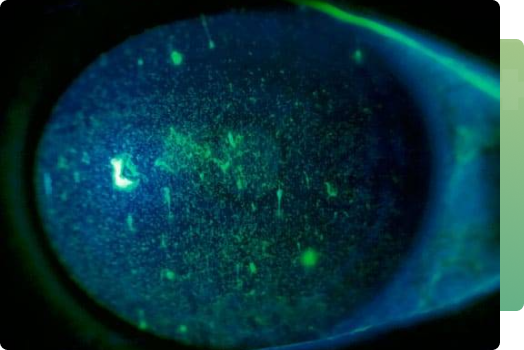


Treating allergic eye disease, particularly in its severe and chronic forms, requires a multidisciplinary approach to ensure long-term control and prevent vision-threatening complications. At Narayana Nethralaya, collaboration between ophthalmologists and immunologists plays a pivotal role in managing both pediatric and adult patients with allergic eye conditions such as vernal keratoconjunctivitis and atopic keratoconjunctivitis. This liaison allows for a holistic evaluation of underlying systemic allergic triggers, accurate immunological profiling, and the use of targeted immunomodulatory therapies alongside ocular treatment.
Narayana Nethralaya is a tertiary care centre for complex trauma cases which aims at uninterrupted emergency services 24*7, catering to all strata of patients while providing best quality medical care.Our hospital has 24 hour in house doctor and other paramedical staff to provide prompt primary measures for the following injuries
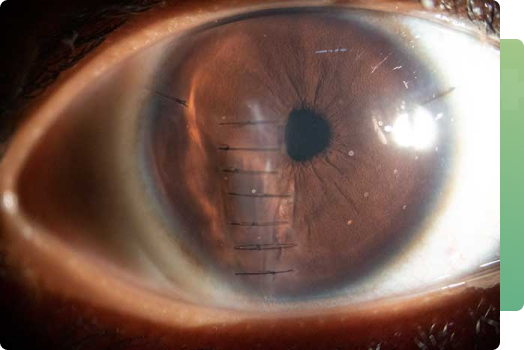
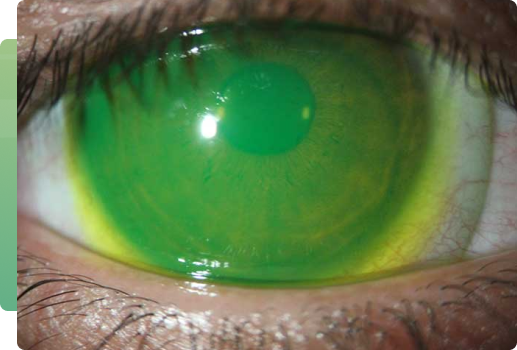
Contact Lens Clinic
Contact lenses serve multiple purposes—not only do they enhance vision, but they can also be used to manage certain non-cosmetic eye conditions. At our clinic, we offer highly specialised services that provide comprehensive solutions for corneal irregularities, improving both visual function and cosmetic appearance.
Following a thorough evaluation of the ocular surface and patient suitability, our experts recommend the most appropriate type of contact lens. We also provide detailed guidance on lens care, usage, and maintenance, helping patients achieve better comfort and performance in their daily activities.
We specialise in:
1. Hard and soft contact lenses
2. Rigid gas permeable lenses
3. Scleral lenses
4. Cosmetic contact lenses
Pterygium surgery removes a benign, wing-shaped growth on the eye’s surface that can cause redness, irritation, or vision problems.Our hospital offers the latest pterygium surgery using advanced sutureless conjunctival autograft with fibrin glue. This modern technique ensures faster healing, minimal discomfort, low recurrence rates, and excellent cosmetic outcomes. Patients benefit from state-of-the-art care, restoring eye health, clarity, and comfort with precision and safety.
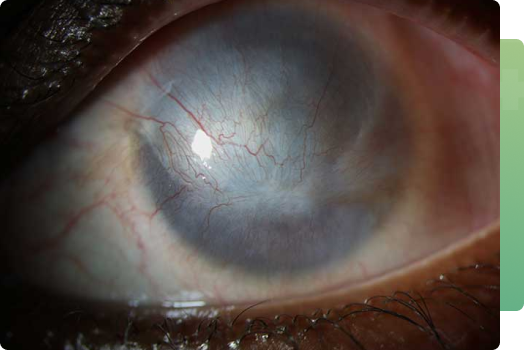
Irregular ocular surface occurring secondary to adverse reactions to medications , ocular injury due to acid / alkalies (chemical substances ) or other conditions in which the cornea and conjunctiva are badly scarred and lose their normal architecture is rehabilitated to restore a relatively normal ocular surface by various advanced procedures which are performed by skilled surgeons at Narayana Nethralaya Eye Hospital.
Corneal Tattooing improves cosmetic appearance of opaque or disfigured corneas and can create an artificial pupil.
Surface Tattooing: Dye applied to anterior cornea after epithelial removal or needle pricks. Quick, less invasive; suitable for leukomas or iris defects. Pigment fades, may need repeat; can cause surface discomfort.
Intrastromal Tattooing: Dye implanted into deep stroma via lamellar pocket/tunnel. Ideal for dense leukomas or blind eyes. Uses sterile, micronized pigments. Long-lasting, uniform, less irritation, but technically demanding with risk of stromal thinning or perforation.
Choice depends on opacity depth, eye status, and cosmetic goals.
Keratoprosthesis is an advanced surgical procedure designed to restore vision in patients with corneal blindness who are not suitable candidates for traditional corneal transplantation. Despite its transformative potential, keratoprosthesis is a highly specialized procedure requiring dedicated infrastructure and expertise, and is currently offered at only a few select tertiary eye care institutes across India. Expanding access to this vision-restoring technology is crucial to addressing the unmet needs of corneal blindness in the country.
If you have an eye infection, corneal ulcers/scars/opacity, corneal tear secondary to road accidents and other injuries, chemical injuries to the eye, or firecracker injuries, you should schedule an appointment with an ophthalmologist to get your eyes checked immediately.
Your initial consultation with the doctor will approximately take 2 hours if you do not require cross-consultation, and up to 4 hours if you do. During your consultation, our doctors and counsellors will determine the best course of action for your visual needs, go over the risks and benefits of treatment, and help you choose the procedure best suited for preserving or improving your vision.
We recommend that you bring a family member or friend with you to assist in the decision-making process.
At Narayana Nethralaya, we are committed to providing our patients with advanced quality eye care at affordable prices. These eye surgery experiences stand testimony to the excellence in eye care that we offer.
Computer Vision Syndrome, or digital eye strain, is a condition that arises from prolonged use of computers, mobile phones, or other digital screens. It occurs due to the inability of the eye muscles to recover from the continuous effort of focusing on a near object, often leading to dry eyes. Taking regular breaks (at least 20 seconds every 20 minutes), positioning the screen at least 25 inches from the eyes, reducing screen brightness, using anti-glare glasses, blinking frequently, and using lubricating eye drops can help alleviate the symptoms.
Viruses or bacteria can cause an infection of the superficial structures of the eye; characterized by redness, watering and/or defective vision. This is known as conjunctivitis or popularly as Madras eye. The condition usually takes 2-6 weeks to resolve and may be transmitted from one person to another through contact in the initial 1-2 weeks. Using the correct eye medication and hand hygiene ensures appropriate treatment of this condition.
Diseases of the front central portion of the eye known as cornea, can lead to blindness. Those that cannot be treated with medications alone, require a surgical replacement otherwise called corneal transplantation. In this procedure, either the entire or a few layers of clear cornea from a deceased donor is transplanted into the patient’s eye.
Eyes can be donated after death (ideally within 6 hours) by any individual irrespective of age. The cornea and sclera harvested from the donated eye is utilized for transplantation surgery. In no case, is the donation wasted. The only contraindications for utilization for surgery are the presence of certain types of cancers and certain types of infections in the donor, that hold the risk of transmission to the recipient; however they can be utilized for training and research.
A non-seeing blind eye that cannot be visually rehabilitated often may require a cosmetic correction; due to presence of white discoloration, protrusion and squinting. A coloured contact lens, corneal tattooing with a black/brown pigment, squint surgery and evisceration with implantation of a prosthetic eye are the available options.
Contact lenses are thin transparent devices that can correct the eye power. They are placed directly on top of the cornea. Regular cleansing of lenses before and after use, restricting usage to 8-9 hours/day, avoiding overnight use, regular replacement and avoiding dust/water from directly touching the lens; are some practices for good hygiene. Immediately remove your contact lenses if you develop redness or pain while wearing them and consult your ophthalmologist.
Keratoconus is a condition characterized by progressive protrusion and thinning of the cornea, which can lead to poor vision, visual distortions and/or whitening of the cornea. The various treatment options available are spectacles, contact lenses, crosslinking (corneal strengthening), intracorneal rings, laser vision correction with crosslinking and implantable collamer lenses. Early recognition and management is the key to a successful outcome.
At Narayana Nethralaya, we are committed to providing our patients with advanced quality eye care at affordable prices. These eye surgery experiences stand testimony to the excellence in eye care that we offer.
A 57 year old farmer came to us with a history to injury to Right eye with a vegetative matter 1 month back, followed by redness, watering and pain in the right eye since then. He gave a history of consultation at a local hospital 20 days back following which he was started on a few eye drops. There was no improvement in symptoms following the usage of the drops, rather the pain and redness seemed to be worsening. On evaluation, he was found to have a large centre involving corneal ulcer with infiltrations. His vision was noted to be just appreciating Hand movements. He underwent a Right eye Full thickness Corneal transplantation to remove the infection. Few weeks after surgery, patient is comfortable and asymptomatic, and is able to return back to his normal daily routine after being advised of the precautionary measures to be taken.
A 6 year old child came to our Emergency Department with an alleged history of injury to left eye while playing with a wooden stick. Parents gave a history of pain, bleeding and blurring of vision in left eye since then. Child was evaluated to have a vision of just appreciating Hand movements. On slit lamp examination, he was found to have a full thickness corneal cut. He was taken up for emergency cornea tear repair under General anesthesia. His vision recovered to 6/12 on follow up. Today, child is comfortable and on routine follow up. He is now back to school and is able to resume his daily activities.
A 8 year old child came to our OPD with a history of accidental spill of Lime particles (Chuna) in Both eyes while playing with a packet of lime kept at home. Parents give a history of trying to wash the particles with tap water and immediately bringing the child to the hospital. Immediately the child was taken up for Eye wash to adequately remove all lime particles stuck to the surface of the eye. Severity of the injury was found to be more in the right eye than the left eye. He was started on intensive eye drops and other medications and was advised very close follow up. Consequently left eye improved with medications. Owing to the severity of injury to the right eye, the child had to undergo an Amniotic Membrane graft in the Right eye under General anesthesia. Hence we were able to save both the eyes and the child could return back to schooling and other daily activities.
A 60 year old female came to our OPD with the complaints of abnormal growth over the cornea of the left eye. She also gave history of watering and irritation in left eye especially on dust and sunlight exposure. On evaluation, she was found to have a left eye Pterygium for which she underwent Left eye Pterygium excision with Conjunctival auto-graft with Fibrin glue. Post operative recovery was good. Presently patient is asymptomatic and is satisfied with the cosmetic improvement following the excision.
At Narayana Nethralaya, “Quality of Care” and “Patient Safety” is our priority. Concern for our patients’ well being is at the core of what we do, and what drives us. Five units of Narayana Nethralaya are NABH Accredited – the highest national recognition for quality in patient care and safety. Our refractive surgeons help patients make an informed treatment choice on the type of treatment and surgery that is best suited for their lifestyle. We have an exclusive counseling team to address any doubts or questions that people may have about Refractive treatment options, procedures, preoperative testing and post refractive surgery recovery.
